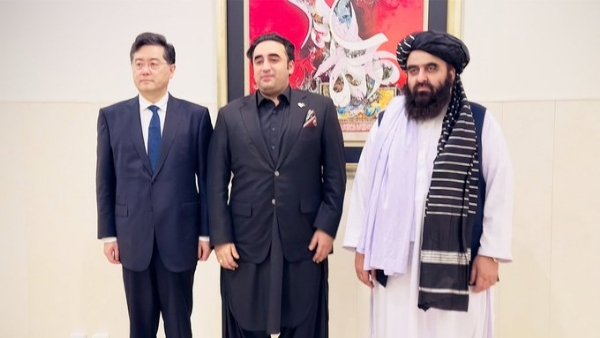Taliban ruled Afghanistan to be a part of China's BRI
The dangers of protectionism, hegemony, and power politics that China warned the world about at the recent SCO foreign ministers’ meeting is precisely what the communist country advocates as it looks at Taliban-ruled Afghanistan as its new resource region.
Total Views |
Kabul, May 12: As the Chinese economy slows down, the new emperor of China Xi Jinping is finding new ways to burn money. After announcing a railway project connecting Xinjiang in China to Pakistan in late April, it now wants to invest in Taliban Controlled Afghanistan under the Belt and Road Initiative(BRI).

The dangers of protectionism, hegemony, and power politics that China warned the world about at the recent SCO foreign ministers’ meeting is precisely what the communist country advocates as it looks at Taliban-ruled Afghanistan as its new resource region. Foreign minister Qin Gang said in Goa, India, at the meeting that the world is faced with multiple crises and challenges featuring a resurgence of the Cold War mentality, headwinds of unilateral protectionism, and rising hegemonism and power politics. He called on the Shanghai Cooperation Organization (SCO) member states to uphold strategic independence and deepen security cooperation.
🇦🇫🇵🇰🇨🇳| Taliban Agree With China and Pakistan To Join BRI
— Dongsheng News (@DongshengNews) May 10, 2023
This has the potential to bring billions of dollars in investment to the war-torn country. The three agreed to the extension of the US$60 billion China-Pakistan Economic Corridor to Afghanistan on Saturday. pic.twitter.com/WychWIJ4lS
Around the time Gang was extolling the merits of transparent internationalism, the Taliban, which controls Afghanistan, agreed to extend the Belt and Road Initiative to Afghanistan, potentially bringing in billions of dollars to fund infrastructure in the nation. Media reports said that the Taliban has agreed with China and Pakistan to extend the Belt and Road Initiative to Afghanistan, potentially drawing in billions of dollars to fund infrastructure projects in the sanctions-hit country. The reports said Foreign Minister Qin Gang and his Pakistani counterpart Bilawal Bhutto Zardari met in Islamabad and pledged to work together on Afghanistan’s reconstruction process, including taking the $60 billion China-Pakistan Economic Corridor to the Taliban-ruled nation. “The two sides agreed to continue their humanitarian and economic assistance for the Afghan people and enhance development cooperation in Afghanistan, including through extension of CPEC to Afghanistan,” the report quoted a joint statement issued by Pakistan’s foreign ministry following the meeting. It said Chinese and Pakistani officials have previously discussed extending the project to Afghanistan, built under President Xi Jinping’s flagship Belt and Road initiative that started almost a decade ago. It stated the cash-strapped Taliban government had expressed readiness to participate in the project and the prospect of getting much-needed infrastructure investment. “The Taliban’s top diplomat, Amir Khan Muttaqi, traveled to Islamabad to meet his Chinese and Pakistani counterparts and reached an agreement, his deputy spokesman Hafiz Zia Ahmad said by phone,” it said. “The Taliban have also harbored hopes for China to boost investments in the country’s rich resources, estimated to be $1 trillion. The government inked its first contract in January with a subsidiary of China National Petroleum Corporation to extract oil from the northern Amu Darya basin.” China and Pakistan now jointly ask the West, especially the United States, to unfreeze Afghanistan’s overseas financial assets — USD 9 billion of Afghanistan’s central bank reserves held overseas on concerns the funds will be used for terror activities and blocked from Taliban accessing them. The US later agreed to release half of it to bolster the economy but put it on hold after the Taliban imposed certain school and work restrictions on Afghan women last year. China’s Belt and Road Initiative (BRI), launched in 2013, seeks to connect Asia to Africa and Europe, to improve regional integration, increase trade and stimulate economic growth. It also connects China to Southeast Asia, South Asia, Central Asia, Russia, and Europe.
China has also considered Afghanistan’s membership and participation in the BRI, with a delegation from Afghanistan participating in its forum in 2017. Afghan delegations have also been participating in Russian economic and trade development forums. However, despite some agreements in including Afghanistan as part of the China-Pakistan Economic Corridor (CPEC), no progress has currently been made regarding China’s economic presence through the BRI in the country.

